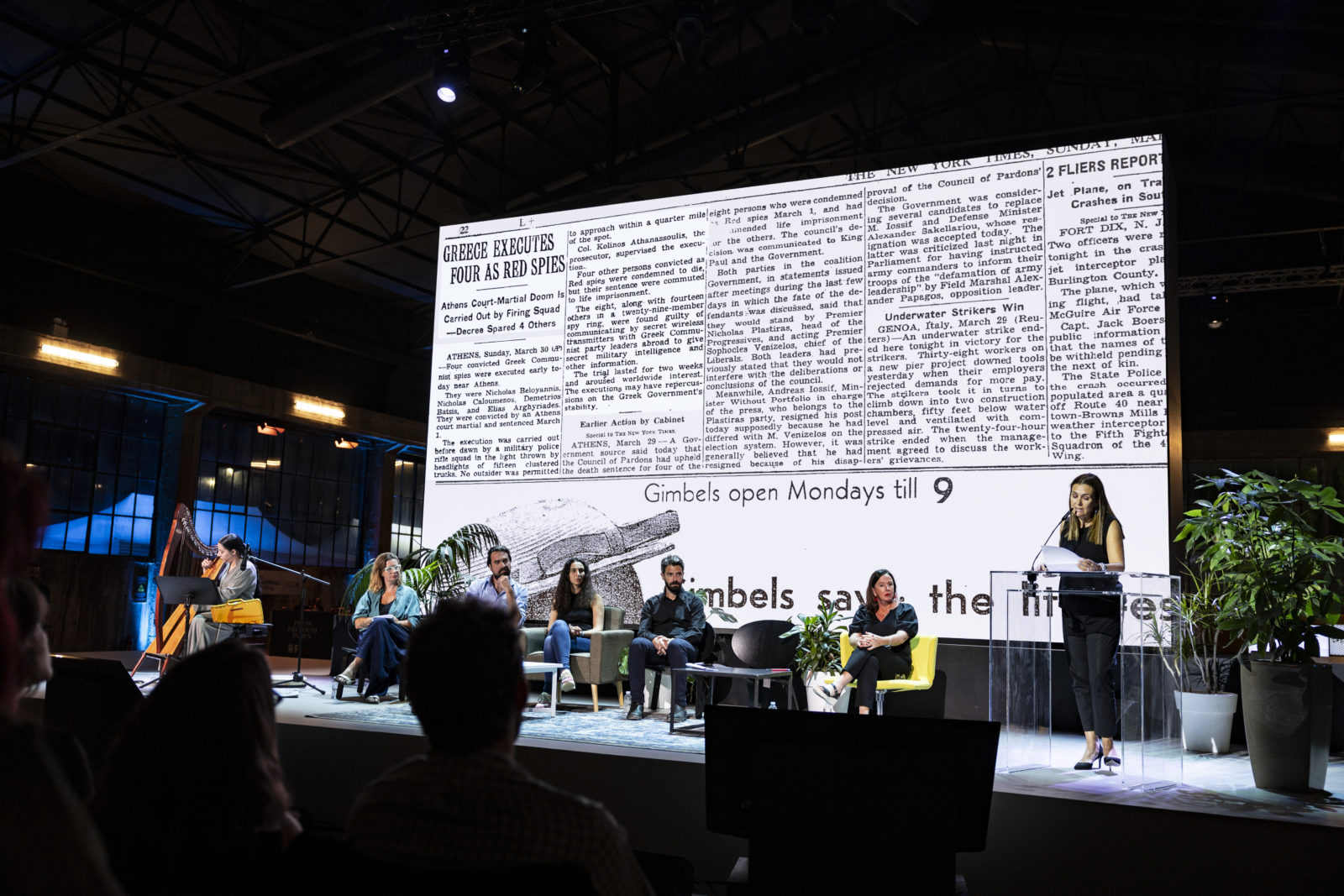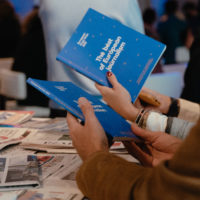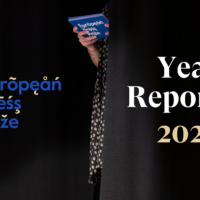All the Prize Community Members at the International Journalism Forum
From September 26 to 28, we will attend iMEdD’s International Journalism Forum in Athens, one of the most important journalistic events in Europe.
Here is a guide to European Press Prize-related panels and events at the IJF 2024.
If you will not attend, you can watch most of them via live streaming, or on demand shortly after the panel has taken place.

Photo by Alex Grymanis
Day 1 – 26 September 2024
Defending Press Freedom: The case of Europe >>
With our PrepCom Member Beata Balogová
The fundamental right of press freedom should not be taken for granted, even in the so-called Western world. In Europe, where some countries rank highly in terms of press freedom, the situation is escalating and deteriorating in many others. Despite efforts, media capture, surveillance, harassment, and even physical threats against journalists remain a tangible reality, highlighting an alarming situation.
Media Village Speed Meet >>
In this session you will have the opportunity to meet the organisations participating in this year’s Media Village. Representatives of each organisation will briefly present their identity, work and actions and highlight aspects of their activities, enabling everyone interested to get to know them better.
Inside the machine: Investigating AI and algorithms >>
With our Laureates Daniel Howden, Giorgos Christides and Pierluigi Bizzini
From policing migration to cracking down on welfare, authorities are turning to artificial intelligence to decide the fate of vulnerable people. Yet such “decision machines” are notoriously opaque. How can investigative journalists reverse-engineer predictive algorithms and get under the bonnet of AI? Journalists from groundbreaking investigations reveal their secrets.
AI and investigative journalism: Opportunities and challenges >>
With our Judge Paul Radu
While tools and resources powered by AI continue to emerge, the conversation around how AI is impacting journalism becomes more frequent. Investigative journalism has advanced both in using AI as a tool, as well as in investigating AI. Concrete examples of how AI has been used to hold the powerful to account and support watchdog journalism, as well as how AI has been held accountable by investigative journalists, will be used to help understand the potentials and limitations.
How to go undercover? >>
With our Laureate Elena Ledda
IJ4EU grantees have gone undercover to unveil shady doings with serious effects on society. Experienced journalists will share their methods for going undercover, from securing evidence to ensuring personal safety. Bring your ideas and questions and join us to gain invaluable insights into the art of undercover journalism.
How to transform a journalistic investigation into a mainstream product >>
With our PrepCom member Lucila Rodríguez-Alarcón and Laureate Patricia Macías
This workshop will address the processes and tools needed to make a journalistic investigation reach large audiences: from the development of key ideas through creative thinking processes, to the construction of the story that is born from the data or the creation of journalistic products that accompany the investigation and that allow to extend its scope and audiences.
What makes an award-winning investigation?
With our PrepCom Chair Cristian Lupșa, Our Laureate Frederik Obermaier and our PrepCom member Lucila Rodríguez-Alarcón
How do you win a prestigious journalism award like the European Press Prize or IJ4EU Impact Award? It starts with a great story – but there’s also an art to making your application shine. Take a tour of stunning projects that have won top honours at European awards. What makes them stand out? What can we learn from how they were presented?
Covering Gaza >>
With our Laureate Manisha Ganguly
This panel discussion will feature the situation in besieged Gaza and the non-access of foreign journalists. What are the implications of the Israel-Hamas conflict regarding the freedom of information and the wider region? Why have more than 150 journalists and media workers been killed covering Gaza and what tools have they used to investigate the war crimes committed? When does the media stop covering a conflict? And after all, how can journalists get to the truth?
Day 2 – 27 September 2024
Greek oligarchs and the media: Seeking transparency in murky waters >>
With our Laureate Danai Maragkoudaki, Moderated by our Laureate Iliana Papangeli
Offshores in Cyprus, the Marshall Islands, and Liberia; dominate shipping, industry, football, and the media: This is the typical profile of Greek oligarchs, the individuals who, among other things, control most of the media in the country. But what about transparency?
Solutions Journalism for small newsrooms >>
With our Laureate Lola García-Ajofrín
In this interactive workshop, you will be introduced to solutions-oriented reporting. You will learn how to identify, research, and pitch stories, which focus on social responses and not solely problems. We will demonstrate how this approach can boost audience engagement, and trust in your reporting and how it can be applied to cross-border collaborations across small newsrooms.
Toward genuine North-South collaborations >>
With our Laureate Daniel Howden
Journalism collaborations from mega projects to individual partnerships are proliferating around the world. But most of the time the stories pursued reflect a vision from the Global North about what matters and what does not. Too often these collaborations fail to take into account local expertise and perspectives, leaving Global South journalists to be treated as “fixers” for their northern counterparts. As the climate crisis intensifies, as populism, disinformation and threats to democracy play out in the south and north, a re-evaluation is urgently needed.
Creative formats to disseminate investigative journalism >>
With our Laureate Jose Miguel Calatayud
When talking to other investigative journalists, many feel that, apart from professionals and activists who are already engaged with the topic at hand, investigations often reach only a very small part of the general public. In fact, it’s not rare for investigative journalists to feel that their audience is mostly made of… other investigative journalists.
Day 3 – 28 September 2024
The AI Spotlight Series >>
With our Laureate Gabriel Geiger
The hype around generative AI is now supercharging the spread of AI tools. As journalists, the onus is on us to reveal, interrogate, and explain this technology’s rapid and widespread integration. Where is AI being used? Where is it working or breaking? Who is being harmed, and who stands to profit?
Surviving the “Attention Economy”: Alternative media models and sustainable innovation >>
With our Judge Paul Radu
In these interesting, complex times we live in, it is common sense we need investigative and explanatory journalism more than ever. But original reporting and good journalism are costly and hardly profitable. Moreover, the media are trying to adapt in the “Attention Economy” and get their stories read, listened or watched by as many people as possible.
Community-led design: Τhe future of journalism >>
Moderated by our PrepCom Chair Cristian Lupșa
Journalism can’t continue to be the only industry where the customer is always wrong! If people aren’t engaging with the news, then that’s a problem with the product rather than the people. So how do we understand what people and communities want and need? The simple answer is “ask them” – but who you ask, what you ask and how you ask are critical if we want to build relationships, trust and the kind of journalism that meets the needs of everyone, not just a privileged few.
From anecdote to investigation: Techniques for covering gender-based violence >>
With our Laureate Sotiris Sideris
Gender-based violence stories often start from a single anecdote and very few records; people are afraid to report, there is little evidence, or datasets are often missing pieces, decentralised, and flawed. How can journalists report on the patterns of violence when it’s so difficult to access figures and get a sense of scale?
Linking the climate crisis to the responsibilities of oil companies >>
With our Laureates Daniela Sala and Sara Manisera
While globally the impact and effects of the climate crisis are eventually receiving more coverage, there is still little attention on its root causes and too often the names of companies and corporations bearing consistent responsibilities in it are missing in the narrative – namely, international oil and gas companies.
How art can help journalism go through the rise of AI >>
With our Nominee Jakub Gornicki
Publishers, media and journalists are already being affected by the rise of AI-driven tools. In the next two years, viewers and citizens will access information differently. Outriders combines art, journalism and mobile first approaches to create stories about migration, conflict and climate crisis. They believe that time saved thanks to AI can be re-used for us to become even more creative.





